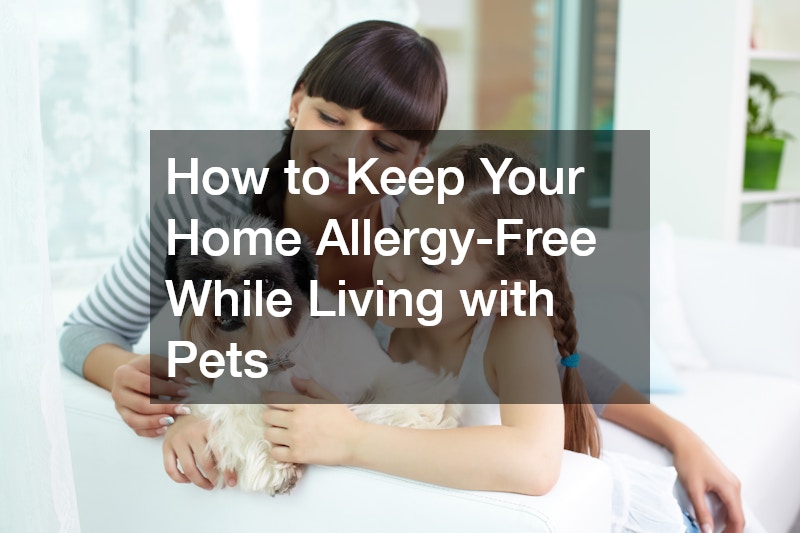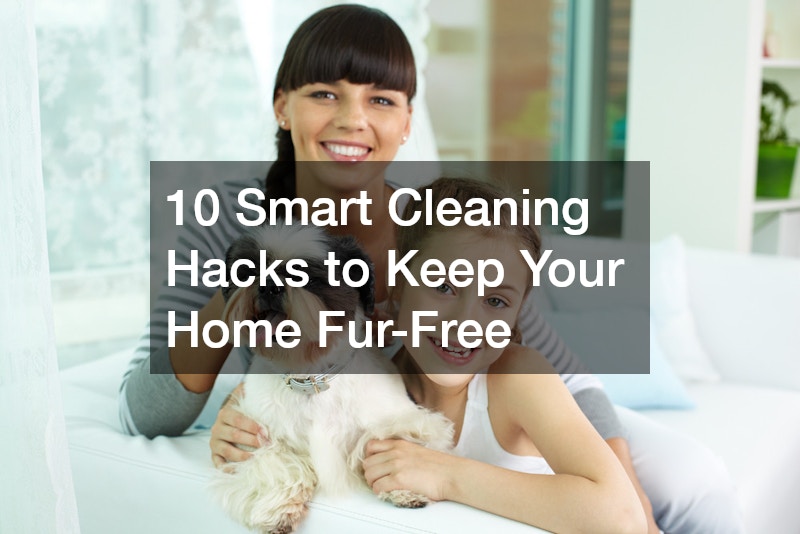Living with pets brings immense joy, love, and companionship, but it also presents challenges when it comes to managing allergens in your home. Pet hair, dander, and outdoor allergens can quickly accumulate, making it difficult to maintain a clean and healthy environment—especially for family members with allergies. Striking the right balance between enjoying your furry friends and keeping your home allergy-free is crucial for everyone’s comfort and well-being.
Fortunately, with the right strategies and tools, you can create a home that minimizes allergens while keeping your pets happy and healthy. From routine grooming appointments with a trusted dog groomer to maintaining clean air with regular HVAC services, there are plenty of practical steps you can take to reduce allergy triggers.
This guide provides actionable tips to help you maintain a clean, allergy-free living space without sacrificing the joys of pet ownership. Let’s get started!
1. Control Pet Hair and Dander with Regular Grooming
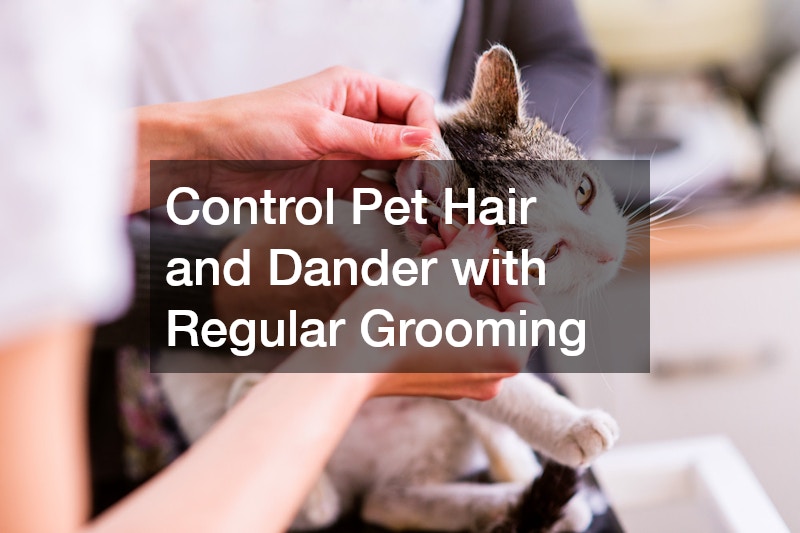
One of the biggest contributors to allergies in homes with pets is pet hair and dander. Dander, the tiny flakes of skin that pets shed, contains proteins that can trigger allergic reactions in sensitive individuals. Managing these allergens starts with a consistent grooming routine.
Regular grooming helps to minimize shedding and reduce the accumulation of dander in your home. Schedule visits to a professional dog groomer for services like bathing, brushing, and trimming. Groomers use specialized tools and techniques to remove loose hair and dead skin effectively, ensuring that allergens are kept to a minimum. This is especially important for breeds that shed heavily or have thick, double-layered coats.
In addition to professional grooming, brushing your pets at home on a regular basis can further reduce the amount of hair and dander that ends up on your floors, furniture, and carpets. Use a high-quality brush designed for your pet’s coat type to achieve the best results.
Bathing your pet once every few weeks with pet-safe shampoo also helps to reduce dander. Be cautious not to overdo it, as excessive bathing can dry out your pet’s skin, which may increase shedding and irritation.
By prioritizing grooming, you can significantly reduce allergens in your home, creating a cleaner and more comfortable environment for everyone.
2. Invest in High-Quality HVAC Systems
Your home’s HVAC system plays a critical role in maintaining clean air and reducing allergens. Pet hair, dander, and dust can easily circulate through your home if your HVAC system isn’t properly maintained. Investing in routine HVAC services can help improve air quality and create a healthier environment for you and your pets.
Start by installing high-efficiency particulate air (HEPA) filters in your HVAC system. These filters are specifically designed to trap pet hair, dander, and other airborne particles, preventing them from spreading throughout your home. Change these filters regularly, as clogged filters can reduce efficiency and allow allergens to recirculate.
Schedule annual or biannual maintenance with an HVAC technician to clean air ducts and ensure your system is functioning optimally. Dirty ducts can harbor allergens, which are then redistributed whenever the HVAC system is running.
Additionally, consider using portable air purifiers with HEPA filters in high-traffic areas where your pets spend the most time. These devices can provide extra filtration, especially in rooms where allergens tend to accumulate.
By maintaining your HVAC system and incorporating advanced filtration, you can significantly reduce allergens, ensuring cleaner air for you and your family. Regular upkeep not only benefits your health but also extends the lifespan of your HVAC system.
3. Keep Floors and Carpets Clean
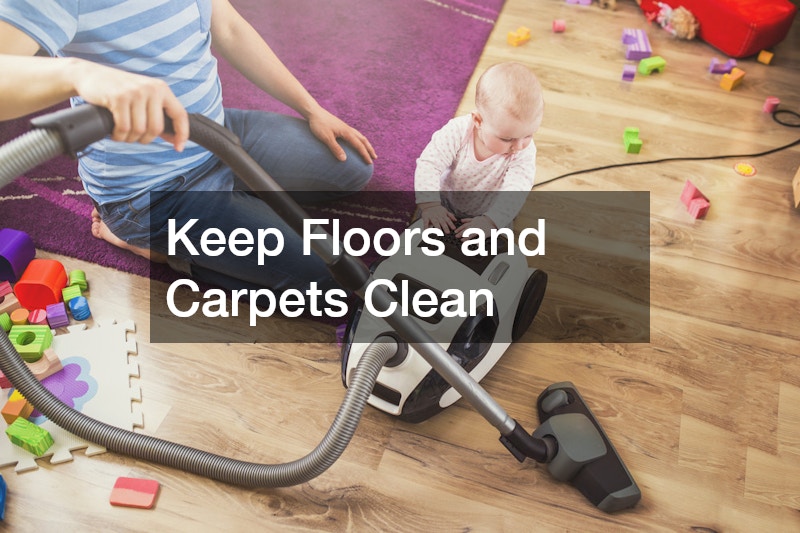
Floors and carpets are prime locations for pet hair, dander, and allergens to accumulate, making regular cleaning essential for maintaining an allergy-free home. Pet hair can get embedded in carpets and rugs, while hard floors can become a breeding ground for dust and dander if left uncleaned.
Vacuum carpets and rugs at least twice a week using a vacuum cleaner with a HEPA filter. These filters trap tiny particles like pet dander and prevent them from being released back into the air. For hard floors, use a microfiber mop or cloth to pick up fine dust and hair more effectively than traditional sweeping.
Consider professional cleaning services for a deeper clean every few months. Carpet cleaners can remove deeply embedded allergens, while hard floor cleaning specialists can sanitize and polish surfaces. If allergies are a persistent problem, consider replacing carpets with allergy-friendly flooring options like hardwood, laminate, or tile, which are easier to clean.
To further reduce allergens, wash area rugs, pet bedding, and throw blankets regularly in hot water. This kills dust mites and removes hair and dander that have settled on fabrics.
By staying on top of floor and carpet maintenance, you’ll keep allergens under control and create a cleaner, healthier home environment for your family.
4. Manage Waste Effectively
Pet waste, including fur, litter, and other debris, can be a significant source of allergens and unpleasant odors in your home. Proper waste management is essential for maintaining a clean and allergy-free living space.
Start by using reliable trash services to ensure pet waste is promptly and properly disposed of. Keep a designated trash bin for pet-related items like used litter, grooming clippings, and soiled pads. Make sure the bin has a tight-fitting lid to prevent odors and allergens from spreading.
For cat owners, regularly clean and replace litter in the litter box. Choose low-dust, hypoallergenic litter to minimize airborne particles that can irritate allergies. Place the litter box in a well-ventilated area and clean it daily to prevent odors and bacteria from accumulating.
Wash your pet’s bedding, blankets, and toys frequently in hot water to remove dander and allergens. Also, sanitize feeding bowls and grooming tools regularly to prevent the buildup of dirt and bacteria.
Lastly, maintain a clean outdoor area for your pets. Dispose of waste promptly and keep the yard tidy to prevent allergens like pollen and mold from being brought inside.
Effective waste management not only reduces allergens but also promotes a healthier and more hygienic home environment for you and your pets.
5. Prevent Mold Growth and Moisture Issues
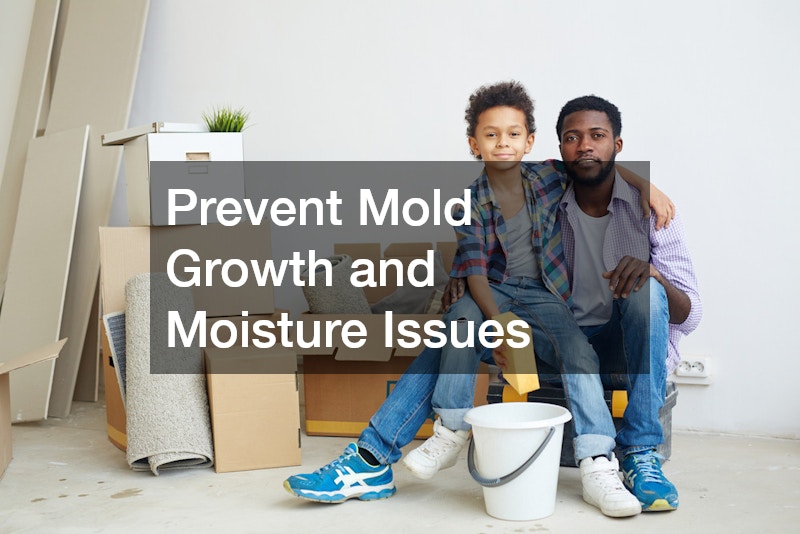
Mold thrives in moist environments, and pets can inadvertently contribute to moisture buildup in your home. Mold is a common allergen that can worsen respiratory problems, making its prevention crucial in an allergy-free home.
Start by addressing any areas prone to dampness. Use dehumidifiers to maintain an indoor humidity level between 30-50%, which helps inhibit mold growth. Regularly check areas like bathrooms, kitchens, and basements where moisture is more likely to accumulate.
Pets tracking in water or mud can also introduce excess moisture. Dry their paws and fur thoroughly after outdoor activities to prevent damp surfaces inside your home.
If mold is already present, enlist a professional mold removal service to address the issue thoroughly. They can identify hidden mold, safely remove it, and prevent recurrence.
By managing moisture and taking preventative steps, you can reduce mold-related allergens and keep your home healthy.
6. Maintain Outdoor Spaces
Your outdoor spaces play a vital role in keeping your home allergy-free, as pets often bring in outdoor allergens like pollen, mold, and dirt. Regular maintenance ensures a clean and safe environment for both you and your pets.
Start by installing aluminum fencing to create a secure area for your pets while maintaining a tidy yard. Fencing helps contain pet activity, reducing the spread of dirt and allergens throughout your outdoor space.
Regularly mow the lawn, trim bushes, and remove fallen leaves or debris to minimize the buildup of allergens like pollen and mold. Clean your pet’s outdoor play areas frequently to keep them sanitary and allergen-free.
Ensure outdoor pet waste is promptly removed and properly disposed of to prevent odors and bacteria from spreading.
By keeping your outdoor areas clean and well-maintained, you can significantly reduce the allergens pets track indoors, creating a healthier home environment.
7. Schedule Routine Veterinary Checkups
Keeping your pets healthy is a key part of maintaining an allergy-free home. Routine veterinary care ensures your pets are in optimal health and free from conditions that can exacerbate allergies, such as fleas, skin infections, or excessive shedding.
Visit local vet clinics or an animal hospital for regular checkups, vaccinations, and preventative care. A vet can provide advice on managing pet allergies, such as dietary changes to reduce shedding or treatments for dry skin that causes dander.
Ensure your pet is free of parasites like fleas or ticks, as their presence can lead to scratching, shedding, and additional allergens in your home. Regular health evaluations also help detect any underlying issues that could worsen allergy symptoms.
By prioritizing your pet’s health, you not only enhance their well-being but also create a cleaner, healthier home environment for everyone. Healthy pets lead to happier, allergy-free homes.
8. Prioritize Regular Home Cleaning
A consistent cleaning routine is essential for reducing allergens in homes with pets. Pet hair, dander, and dust can quickly accumulate on surfaces, furniture, and fabrics, making frequent cleaning a priority for maintaining a healthy environment.
Dust surfaces regularly using a microfiber cloth to trap allergens instead of dispersing them into the air. Vacuum carpets, rugs, and upholstered furniture at least twice a week with a vacuum cleaner equipped with a HEPA filter to remove fine particles like dander and dust mites.
Wash pet bedding, blankets, and toys in hot water weekly to eliminate allergens and bacteria. Use hypoallergenic cleaning products to avoid introducing harsh chemicals that could irritate allergies further.
Don’t forget hard-to-reach areas like baseboards and behind furniture, where allergens tend to settle. A thorough cleaning routine helps create a healthier living space for both you and your furry friends.
9. Create Pet-Free Zones
Designating specific areas of your home as pet-free zones can significantly reduce allergen exposure, especially for individuals with sensitivities. Bedrooms are an ideal choice for a pet-free zone, as this ensures you have a space where you can rest and recharge without allergens disrupting your sleep.
Use barriers like aluminum fencing, baby gates, or closed doors to enforce these boundaries. Keep pet-free zones clean by vacuuming regularly with a HEPA-filter vacuum and wiping down surfaces to eliminate dust and dander.
Ensure these areas are equipped with air purifiers to further improve air quality and reduce airborne allergens. Adding hypoallergenic bedding and maintaining proper ventilation can make the space even more comfortable.
By creating dedicated spaces free from pet allergens, you provide a haven for family members with allergies while maintaining a healthy balance in your home for both pets and people.
10. Consider Allergy-Friendly Flooring Options
Flooring plays a significant role in managing allergens in your home. Carpets, while cozy, can trap pet hair, dander, and dust, making it challenging to maintain an allergy-free environment. If allergies are a persistent concern, consider replacing wall-to-wall carpeting with allergy-friendly flooring options such as hardwood, laminate, or tile.
These smooth surfaces are easier to clean and less likely to harbor allergens. For added comfort, use washable area rugs that can be cleaned regularly in hot water to remove pet dander and dust mites.
If replacing carpets isn’t an immediate option, invest in professional cleaning services to deep-clean and extract embedded allergens from your existing flooring. Regular vacuuming with a HEPA filter vacuum also helps minimize allergen buildup.
By choosing allergy-friendly flooring or maintaining your current floors effectively, you can create a cleaner, healthier home for both your family and your pets.
Conclusion
Living with pets doesn’t mean sacrificing a clean, allergy-free home. With the right strategies and consistent efforts, you can create a healthy, comfortable environment for your family while keeping your furry friends happy. Regular grooming, routine cleaning, and timely health check-ups for your pets play a significant role in minimizing allergens. Trusted veterinary services are essential for keeping your pets healthy and addressing any conditions that might exacerbate allergy issues.
Prioritize cleanliness by vacuuming frequently, washing pet bedding, and deep-cleaning carpets. Take preventative measures like using mold removal services to tackle hidden allergens and setting up aluminum fencing to manage outdoor spaces effectively. Regular visits to local vet clinics ensure your pets stay healthy, minimizing potential allergy triggers.
By combining these proactive practices with a commitment to routine maintenance, you can enjoy the companionship of your pets without compromising your family’s well-being. A little effort goes a long way in creating an allergen-free haven for everyone.

